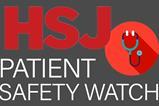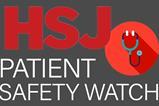HSJ is now hosting the Patient Safety Watch newsletter, written by Patient Safety Watch chief executive James Titcombe.
Good afternoon and welcome to this fortnight’s Patient Safety Watch newsletter. This edition is being published on Nurses’ Day 2023, so I’d like to start with a big thank you to everyone working within the nursing profession.
Earlier this week, I had the pleasure of helping to judge the Chief Nursing Officer’s “Star” awards at University Hospitals of Morecambe Bay Foundation Trust, which gave me a real insight into the brilliant job nurses do day-in day-out. It was humbling to read so many examples of staff going well above and beyond to care for patients and families. I’ve no doubt similar stories are being repeated every day across the country.
While recognising how hard individuals are working, news covered in this edition yet again highlights the difficult conditions NHS staff face, and the impact these pressures are having on patient care.
Nursing staff fear another big NHS care scandal is likely
Last week, the Nursing Times published the results of its survey of 2,200 nursing professionals working in UK hospitals, including registered nurses, healthcare support workers, nursing associates and nursing students. The results paint a worrying picture ”where understaffing is rampant and workload is too high… many nurses continue to feel unable to speak up about safety concerns… and where patient safety is less of a priority than patient flow”.
A large minority (42 per cent) of nurses who took part in the survey reported they had “regularly” witnessed poor care on their ward or unit in the past 12 months, and a further 42 per cent had seen it at least once. Just 12 per cent said that they had not seen any poor care over that period.
One survey respondent is quoted as saying “patient care is a luxury we can’t give anymore”.
Responding to the results, Deb Hazeldine, who lost her mum following poor care at Mid Staffs and subsequently played a key role in campaigning to bring about the Francis inquiry, told me: ”Reading that nursing staff are in tears is beyond distressing… As a daughter who witnessed first-hand the lack of staffing and the devastating consequences this can lead to, I hope that our history is not being forgotten. Sixteen years after my mum’s unnecessary suffering, I still vividly remember those days on the understaffed wards.
“No one can ever attend a public inquiry again and say that they were unaware of how Mid Staffs happened because there are a million pages of documentation that evidence why safe staffing is vital and we should never again have to make the case for this.”
As highlighted in our last newsletter, HSJ has recently reported senior NHS leaders have warned of “intimidating conversations” and pressure to ”hold down staffing levels”. The lessons from history are clear, yet the signals from leaders and staff right now all point towards an NHS that is heading in the wrong direction.
Expansion of apprenticeships expected to be key part of forthcoming government’s workforce plan
According to the Independent, NHS England chief executive Amanda Pritchard told students during a visit to a school in Durham: “The NHS is looking to expand apprenticeship schemes over the coming years, offering a different route into the NHS, where students can earn while they learn instead of going through the university route… This radical new approach could see tens of thousands of school-leavers becoming doctors and nurses, or [working in] other key healthcare roles after being trained on the job, over the next 25 years.”
The news has been met with mixed response. The British Medical Association expressed “fears that NHS employers would not be able to deliver the high standard of training afforded to medical students at university”, while other experts highlighted that “the health service would be unable to provide enough experienced doctors and nurses to deliver on-the-job training”.
All eyes will be on the details of the full workforce plan, which is expected within the next few weeks.
In other news this fortnight:
Fresh concerns over launch of safety reporting system
HSJ reported new concerns have emerged over the timetable for learning from patient safety events, as an upgrade is due to a major piece of risk management software used by the majority of trusts shortly before the planned launch date. NHSE has already delayed the database’s launch by six months to this September. LPSE – which is replacing the national reporting and learning system – aims to make it easier for staff to report safety incidents and also capture data from primary care.
Government’s ‘ambiguity and delay’ sparks ire with patient safety commissioner
National patient safety commissioner Henrietta Hughes has written to the Department of Health and Social Care to complain that her budget for the year has still not been set, pointing out: “This ambiguity and delay is impacting on my ability to arrange patient engagement events as these require a budget.” It follows a letter earlier this year – from Commons health and social care committee chair Steve Brine to health secretary Steve Barclay – which highlighted concerns over insufficient funding and staffing for Dr Hughes’ work.
Midwifery course loses accreditation over safety fears
According to BBC News, the Nursing and Midwifery Council has pulled its accreditation of Kent’s Canterbury Christ Church University’s midwifery course over concerns students were not gaining the expertise to deliver safe and effective care. While the NMC said the decision was made in the “best interests of women, babies, and families”, the loss of accreditation will have knock-on effects for the local workforce, as many of the 100-plus students on the course would have been expected to take up roles nearby.
Lawyers urged to help uncover baby death scandals
The Law Society Gazette has reported how bereaved parents who helped to force an inquiry into baby deaths in Nottingham have issued a rallying call to solicitors to enable more families to do the same.
Speaking at the Society of Clinical Negligence Lawyers conference in Birmingham, Jack and Sarah Hawkins – whose daughter Harriet was stillborn at Nottingham City hospital in 2016 – said the legal profession should collaborate more to uncover any systemic failings in NHS trusts. Ms Hawkins told the conference they were left to find and hear from other families themselves, but ”lawyers could have a role in sharing information, putting clients in touch with each other and helping to allow them to secure justice beyond any civil claim they might be leading”.
New mums missing out on mental health services
A new report by the Maternal Mental Health Alliance has highlighted that pregnant women and new mums are missing out on vital mental health services, while the NHS is not on track to meet key targets.
Around one in five women experience mental health problems during or after pregnancy and suicide remains the leading cause of direct maternal death in the first postnatal year. However, the research found that, while the overall provision and quality of specialist perinatal mental health services has improved, progress across the UK has been uneven “largely due to workforce planning and shortage issues, made worse by insecure or late allocation of funds”.
Sharing some good stuff…
Celebrating excellence in maternity and neonatal care
The charity Baby Lifeline has launched its MUM Awards 2023, and want to hear from families across the UK who have an inspiring story to share.
Sara Ledger, Baby Lifeline’s head of research and development, told me: “NHS maternity professionals work tirelessly to safely deliver maternity care despite the immense strain the workforce is currently under. The UK has a relatively high rate of neonatal mortality compared with other countries – 13 babies a day die either before, during or shortly after birth in the UK – and more needs to be done to improve care and prevent these tragedies.
“Baby Lifeline wants to give an opportunity to showcase stories of when care has been exceptional – to celebrate the hard work of professionals in the NHS and give families a chance to say ‘thank you’. The multi-professional judging panel includes leaders dedicated to maternity safety – Dame Ruth May, Donna Ockenden, Gill Walton CBE, and Dr Ranee Thakar – to name a few.”
More information about the awards and how to submit a nomination is available here.
That’s all for this edition, please look out for our next newsletter and guest blog in two weeks’ time.
Until then, thanks for reading and stay safe.































No comments yet